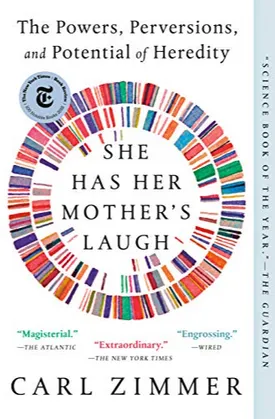She Has Her Mother's Laugh: The Powers, Perversions, and Potential of Heredity by Carl Zimmer
Carl Zimmer’s She Has Her Mother’s Laugh explores the powers, perversions, and potential of heredity and its effects on both individuals and societies. Zimmer examines the complexities of inheritance and generational influence, from genes that influence intelligence and physical characteristics, to familial predispositions for behavior and diseases. The book looks at advancement in genetics, and the questions and implications raised by the technology.
In She Has Her Mother’s Laugh, Zimmer delves into the history of the science of heredity, from its beginnings in ancient times to the modern day. He looks at how early thinkers such as Aristotle and Gregor Mendel viewed the transmission of traits between generations, and how the concept of heredity has evolved over time. He talks about uncomfortable, and misunderstood, topics such as eugenics and racism.
Zimmer then examines the modern-day science of genetics, looking at the advances made in the last few decades with the Human Genome Project and DNA sequencing. He looks at both the positive and negative implications of these advances, such as the potential to use genetics to treat or prevent specific diseases, and the potential for exploitation by those with nefarious intentions.
Zimmer goes further, discussing areas such as epigenetics, which looks at how environmental factors can affect the expression of genes, and how this affects generations not just physically but also psychologically. He explores the roles that genetics can play in development and behavior, and touches upon the critical and controversial topic of prenatal genetic screening.
Ultimately, Zimmer argues that genetics needs to be approached with caution and understanding, looking beyond the phenotype to the deep implications of a person’s genealogy. He explores the implications for free will, when one considers a person’s “destiny” to be predefined by their DNA. He also looks at the potentially serious implications for societal structures when individuals are categorized by their genetics, contrasting the notion of biological determinism with free will.
Zimmer’s book is a fascinating exploration of heredity, from its roots in the ancient world to its implications in the modern world. He clearly and thoroughly explains complex topics related to genetics, making it both accessible and interesting to readers. Ultimately, the book provides a thought-provoking look at the power and potential of heredity, and the delicate balance that must be maintained between the rights and safety of individuals, and science and technology’s race towards progress.

